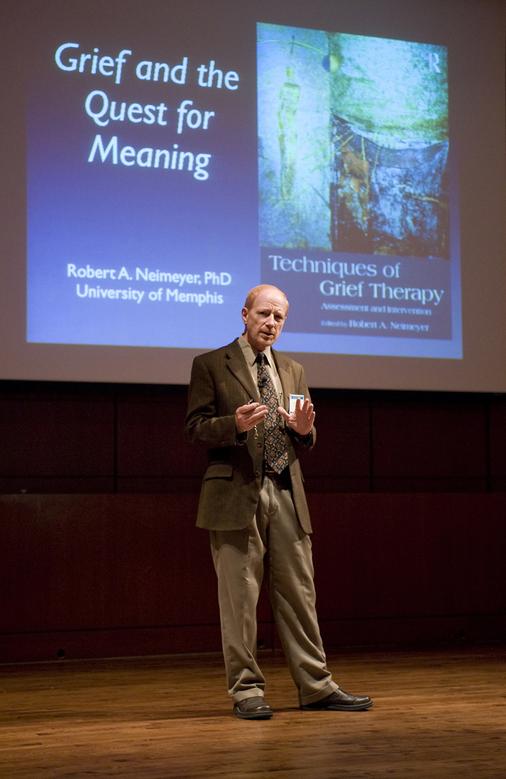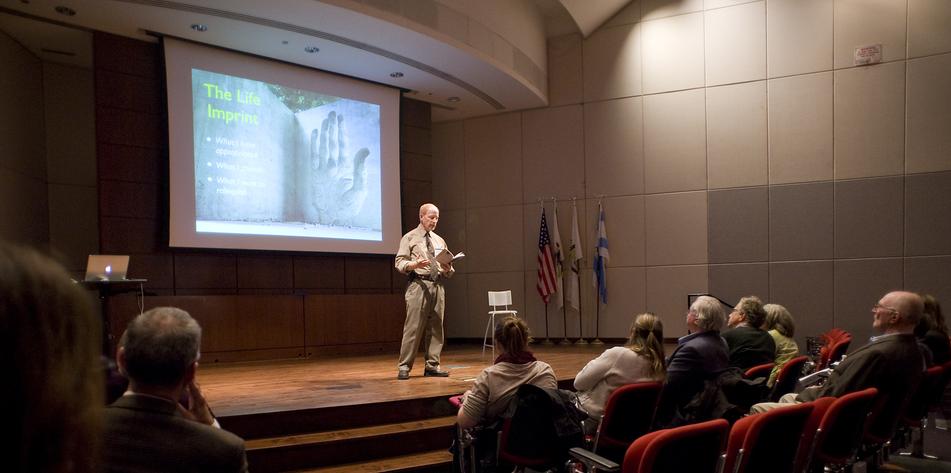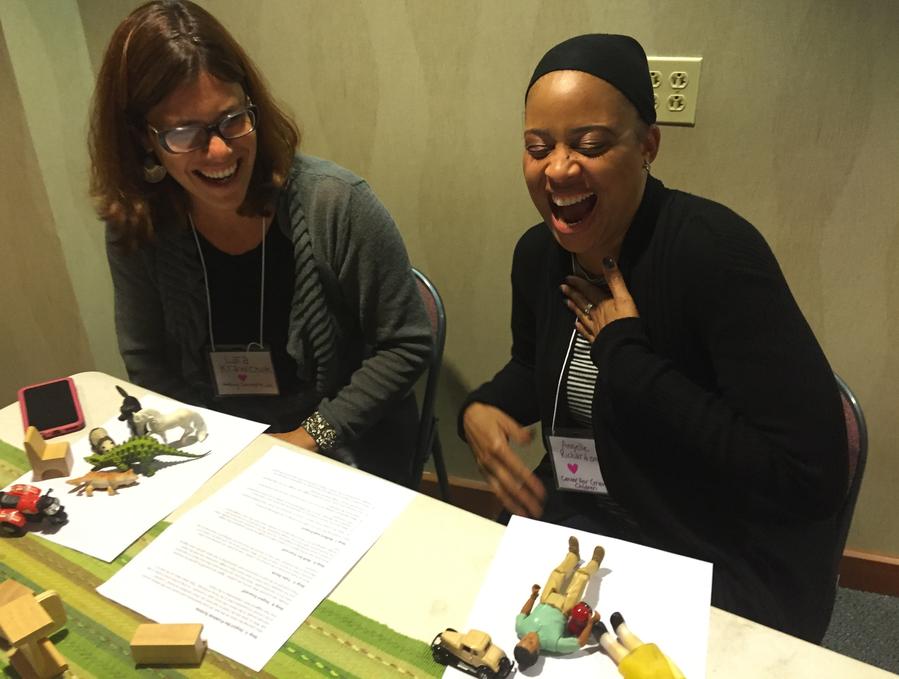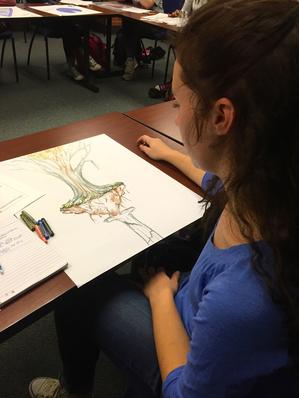Essential information
Format: Invited presentations or experiential workshops
Length: 1 hour to 5 days, with 1 and 2-day workshops being the most popular
Audience size: Groups of 25-300 students or professionals for experiential workshops, audiences of 50-3,000 or more for plenary presentations at conferences
Room set-up and Audiovisual requirements: See following web page in pull-down menu for details
Simply contact me for more information about sponsoring any of these training opportunities for your conference participants, staff, or local professionals.

Intervening in Meaning:
A Masters Class in Grief Therapy
You’ve spent years offering support to bereaved people. And when they appear “stuck” in an anguishing and life vitiating grief, you’ve used reliable procedures to help them manage waves of disruptive emotion, reconnect with others, and envision a changed life and changed bond with their deceased loved one. You’ve likely encountered and found inspiration in some of the newer models of grieving, and perhaps even sought training in recent evidence-based protocols for addressing the possible complications in bereavement. But where can you turn to find an ample frame for this work, one that respects the fundamental role of our personal presence to a client’s suffering, while also helping us navigate the sometimes mysterious process of therapy within which we perform specific procedures?
This workshop is designed to answer just these questions. Beginning with a discussion of the multiple meanings of meaning, it offers to experienced grief therapists a generous set of principles for practice, illustrated in clinical video, live demonstrations and experiential exercises. Pushing beyond a conception of bereavement support as “talk therapy,” we will then consider several methods for exploring grief related metaphors, imagery and embodied knowing, artfully integrating visual media with analogical listening to deepen clients’ awareness of their implicit needs in relation to their particular loss. In keeping with a constructivist understanding of resistance to change as a coherent expression of often inarticulate core beliefs and purposes, we will consider how to invite and engage such “immunity to change” in the process of therapy, and watch this non-counteractive stance unfold in recordings of actual sessions. Finally, we will practice visual supervision of current therapy cases, in order to understand more clearly the problem systems in which both our clients and we are enmeshed, and to imagine more constructive alternatives. Described by previous participants as “wildly creative, but practically relevant,” this workshop is intended to stimulate clinical creativity in grief therapy, enlivening both experienced practitioners and the clients they serve.
Learning objectives:
- Identify 4 “principles of practice” that guide the process of responsive grief therapy
- Refine skills for using position work in counseling through the use of choreography and imaginal conversations to address "unfinished business" with the dead
- Meld analogical, body-oriented work with expressive arts modalities to promote fuller articulation and renegotiation of felt meanings
- Spot the emergence of “immunity to change” processes in order to befriend resistance and overcome unconscious roadblocks to therapeutic progress
- Engage actual problem systems of current clients through symbolic expression, in order to imagine fresh possibilities in difficult therapies
Schedule [can be adjusted to accommodate local requirements]:
9:00-10:30 The Meaning of Meaning
10:30-10:45 Break
10:45-12:15 Principles of Practice for the Reconstruction
of Meaning
12:15-1:15 Lunch
1:15-2:45 Dialogue with Loss: Conversing with the Canvas
2:45-3:00 Break
3:00-4:30 Encountering Resistance: Working with
Pro-symptom Positions
Workshops


Although I offer professional training on any time scale ranging from a one-hour conference keynote to 5 full days of experiential workshops for intermediate or advanced training in grief therapy, a two-day format (6-8 contact hours per day of Continuing Education credit) has proven the most popular. Either day of the workshop can be offered as a stand-alone event, however, as can alternative training focused on the following topics:
- Traumatic loss
- Spirituality in bereavement
- Complicated grief
- Grief and the expressive arts
- Masters class on creative practices in grief therapy
Except for brief lecture-based presentations in conference settings, all of my training is highly experiential, anchoring learning in concrete experience (e.g., clinical videos, case studies, live demonstrations), fostering participant reflection (e.g., in small and large group discussion), orienting learners to the most recent theory and research, and coaching participants to actively try out novel treatment methods (e.g., though skill-building role plays).
Techniques of Grief Therapy:
Creative Practices for Counseling the Bereaved
[2-day professional workshop]
Robert A. Neimeyer, PhD
University of Memphis, USA
As contemporary models of bereavement have become more nuanced and empirically informed, so too have the practices available to grief counselors and therapists. This two-day workshop offers in-depth training in several of these techniques, nesting them both within the therapy relationship and in the context of current theories and research that provide flexible frameworks for intervention. Making extensive use of actual clinical videos as well as how-to instruction in the use a numerous therapeutic tools, we will discuss and practice several methods for helping clients integrate the reality of the loss into the ongoing story of their lives, while also reconstructing their continuing bond to their loved one.
About the presenter:
Robert A. Neimeyer, Ph.D., is Professor in the Department of Psychology, University of Memphis, where he also maintains an active clinical practice. Since completing his doctoral training at the University of Nebraska in 1982, he has published 30 books, including Techniques of Grief Therapy: Creative Practices for Counseling the Bereaved and Grief and the Expressive Arts: Practices for Creating Meaning (both with Routledge), and serves as Editor of the journal Death Studies. The author of nearly 500 articles and book chapters, he is currently working to advance a more adequate theory of grieving as a meaning-making process, both in his published work and through his frequent professional workshops for national and international audiences. The recipient of the MISS Foundation’s Phoenix Award: Rising to the Service of Humanity, Neimeyer served as Chair of the International Work Group for Death, Dying, & Bereavement and President of the Association for Death Education and Counseling. In recognition of his scholarly contributions, he has been granted the Eminent Faculty Award by the University of Memphis, made a Fellow of the Clinical Psychology Division of the American Psychological Association, and given Lifetime Achievement Awards by both the Association for Death Education and Counseling and the International Network on Personal Meaning.
Day 1: Processing the Event Story of the Death
Beginning with a discussion of the power of presence as a fundamental dimension of the therapeutic “holding environment,” we will consider how we can quickly assess our clients’ needs, particularly when they struggle with complicated, prolonged grief symptomatology. We will then discuss how to foster a safe relational container for a healing “re-telling” of the loss experience, anchoring such work in both contemporary meaning reconstruction and dual process models and related research. Drawing on clinical videos of clients contending with losses through cancer, sudden accident and suicide, we will learn to listen between the lines of the stories clients tell themselves and others about the death to grasp more fully the unvoiced meaning of their grief, and how we can help them integrate the event story of the death into the larger narrative of their lives. Participants should conclude the session with sharpened skills for clinical assessment, a clearer appreciation for the challenge to meaning and spiritualty associated with violent death bereavement, and an expanded toolbox for using metaphor, body work and a variety of narrative procedures for helping clients make sense of the loss and their response to it.
Learning outcomes:
- Distinguish between therapeutic “presence” and “absence” in the process of therapy
- Recognize empirical risk factors associated with complicated grief reactions
- Implement restorative retelling and situational revisiting procedures for mastering the event story of the loss
- Differentiate between forms of directed journaling that foster self-immersion and self-distancing to modulate emotions evoked by the death
- Outline metaphoric and body-oriented procedures for exploring the sensed meanings of the client’s grief
- Describe narrative techniques for accommodating loss in literal and figurative ways into the changed narrative of the client’s life
Schedule [can be adjusted to accommodate local requirements]:
9:00-10:30 The Power of Presence: Orienting to Client Needs and Resources
10:30-10:45 Break
10:45-12:15 Restorative Retelling: Mastering the Narrative of the Death
12:15-1:15 Lunch
1:15-2:45 Analogical Listening: Exploring Sensed Meanings of Grief
2:45-3:00 Break
3:00-4:30 Chapters of Our Lives: Rewriting Stories of Loss
Day 2: Accessing the Back Story of the Relationship
Death may end a life, but not necessarily a relationship. Drawing on attachment-informed and two-track models of bereavement, we will begin by considering grieving as a process of reconstructing rather than relinquishing our bonds with those who have died, and the circumstances that can interfere with this natural process. Clinical videos bearing on the death of parents, children and spouses will sensitize participants to various impediments to revisiting and reorganizing the “back story” of the ongoing relationship with the deceased, as well as to several techniques that can help move such work forward. Creative narrative, emotion-focused and performative methods will be presented and practiced for re-introducing the deceased into the social and psychological world of the bereaved, fostering a sustaining sense of connection and alliance with the loved one in embracing a changed future, and working through issues of guilt, anger and abandonment triggered by the death and the shared life that preceded it. Participants will leave with several tools for assessing “pro-symptom positions” that complicate grieving, helping clients appreciate the role of the loved one in their construction of their own identities, and re-accessing and revising frozen dialogues with the deceased that hamper post-loss adaptation.
Learning outcomes:
- Identify dimensions of insecure attachment that complicate adaptation to the death
- Distinguish between healthy and unhealthy features of continuing bonds with the deceased
- Describe two procedures for detecting obstacles to accommodating the loss deriving from invisible loyalties to the loved one
- Practice two techniques for consolidating a constructive bond with the deceased as the client transitions toward a changed future
- Choreograph imaginal dialogues between the client and the deceased to reaffirm love and resolve residual conflicts and disappointments
- Direct experiential work to access and restructure problematic emotions linked to the loss and its aftermath
Schedule [can be adjusted to accommodate local requirements]:
9:00-10:30 Continuing Bonds: Tracking Through Bereavement
10:30-10:45 Break
10:45-12:15 Remembering Conversations: Re-introducing the Deceased
12:15-1:15 Lunch
1:15-2:45 Hello again: Corresponding with the Dead
2:45-3:00 Break
3:00-4:30 Enacting Emotion: Reopening Dialogues with the Dead

Click this button to download a Word version of this Workshop Description.

